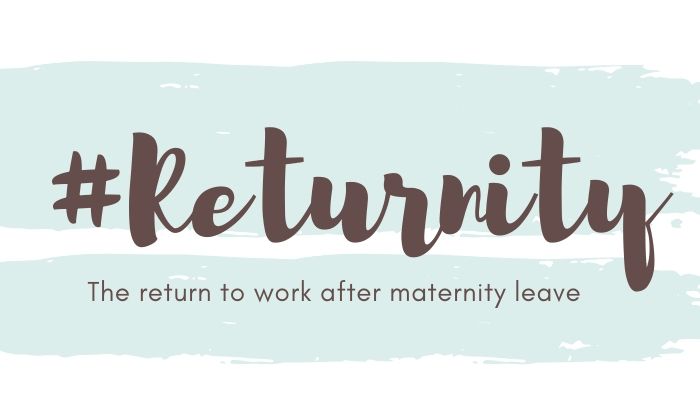#Returnity - The return to work after maternity leave
#RETURNITY- the return to work after maternity leave
RE-TUR-NI-TY (n)
Examples of returnity in a sentence: //I planned for my returnity before taking my maternity leave. //We offer returnity training.
I returned to work a month ago after my third maternity leave, which required -- for a third time -- the following plans and preparations:
Preparing for maternity leave
Preparing my team for when I am away
Preparing my manager for the support needed while I am away
Preparing my family for the new family member
Preparing myself to embrace the newness of motherhood again
Each of these returns share three commonalities:
Research and effort planning for the time away and return.
I put in tremendous effort and research to put together detailed plans for my time away as well as my return, but noticed there wasn’t a resource that already existed. This got me thinking: how many women have the time or resources to spend hours putting a plan together to ensure their time away -- and their return -- is planned in the best interests of the company, their teams, and themselves? The answer: probably only a handful of them.
The mission of my company is so energizing that it was all the motivation I needed to jump back in.
When, during the days leading back to my return, people asked me: “How do you feel, are you excited?” The response was easy: “Yes, I am excited because what we do is save and improve lives, and what bigger motivation does one need? That being said, I will miss my kids, and there is never enough time in the world that you can have with your kids.” But it isn’t necessarily how everybody feels about their returns back to work, no matter how engaging the mission of the company is!
There were a lot of ‘should’ and ‘would’ comments in the days leading up to and soon after my return.
Comments such as- ‘You should ease back in slowly.’ ‘You would benefit from taking your time to transition in.’ or ‘Wow, you really jumped back in!’ While all of these comments are well-intentioned, they can be confusing and challenging to hear when you are just reintegrating into the workforce. As the returning mom, you should be able to have a conversation on setting a pace that feels comfortable to you -- because what works for me may not be what works for you.
I have been fortunate to have had teams and managers who helped and supported me, to ensure we delivered what was needed with the company’s best interest in mind during my time away. Yet, there were many moments of learning.
A mom returning to work isn’t any less smarter, any less capable, any more different nor any less able to determine what she could, should, and would do as she did the three, six or more months prior to leaving on maternity leave. There are plenty of women like me who feel a successful career after kids is important to them. But, each mother may want a different pace and rhythm of re-entry back, and today we have an opportunity to put in place a structure, a process or a conversation point for managers, teams and the new mom to lean on to help with a less bumpy transition back in. If a woman returning to work wants to bring her full self in, let us not dampen her spirits with the “shoulds” and “woulds.” If a mom wants a slower transition in, let’s find a way to engage her and her team around why this is a great option.
Projects face ups and downs when one is away. Returning is an opportunity to realize that a few months is not sufficient to either catapult or tank the progress of projects. Life events can make people absent from their job for short periods of time -- so how can we center the company’s goals and best interests so that we do justice to the contributions of all those involved, both in the short and the long term?
Why do I share this?
Because we need to start a conversation…
How many women in the workforce preparing for maternity leave actually plan for their return with their managers and their teams? And even if they do, how many of their teams have been trained on this transition out and back into work? My guess is not many.
A Harvard Business Review (HBR) article explores the 'dark side' of maternity leaves. "Evidence from a variety of countries reveals that the longer new mothers are away from paid work, the less likely they are to be promoted, move into management, or receive a pay raise once their leave is over. They are also at greater risk of being fired or demoted." [1] "Helen Letchfield of the Training Journal shares, “In 2013, law firm Slater Gordon carried out a survey of 2000 respondents, which identified that half of women returners were overlooked for promotion, and that more than one third had responsibility taken away. Consider the wasted productivity and talent!” [2]. A blog post on the Alium company website shares research that illustrates the improvements that working mothers drive. "Microsoft carried out research and asked 2000 Woman and 500 employers how their performance had changed due to becoming a mother; 57% said mothers make better team players, 29 % said team work improved and 35% said their multi-tasking skills improved."[3] My point is not merely about productivity. It's about centering company goals and matching what someone is prepared to do. And to stop thinking of maternity as some type of disabling process; it isn’t.
During a recent interview on The Nine Oh Six Podcast [4] that I co-host, one of the guests had worked in a large public sector company for 40 years -- and all that time she was the only woman amongst a group of 70 men. The only way for her to get promoted was to move to another city every four years. Being the primary caregiver, she had to forgo many promotions while raising her kids. She reflects on this as a choice she made, not a sacrifice. That woman was my mom -- and I truly admire her perspective. Women will make different choices, so how can we be more prepared at companies and on teams to ensure that their choices are not made to seem like sacrifices?
For women with successful careers -- who choose to have children and then who choose to still pursue a career -- we have an opportunity to educate and empower our teams, our managers, our leaders and the soon-to-be mothers with tools to help prepare for a planned transition into maternity leave and a planned transition into returnity. How can we ensure we offer choices to empower women to pursue their ambitions for their teams, companies and themselves without normalizing a reduction in career progression, pay, or opportunity?
I would love to hear about your maternity experience “returnity” -- the good, the not so good and the great! Please share and comment below!
As Margaret Wheatley shared, “Be brave enough to start a conversation that matters.” Count on me as I have already started one at my company as I transition through returnity.I implore you to do the same.
Sources:
1. Do Longer Maternity Leaves hurt Women's Careers, HBR.org, accessed 10 December 2019, <https://hbr.org/2018/09/do-longer-maternity-leaves-hurt-womens-careers>
2. Supporting managers to manage maternity and paternity, TJ Journal, accessed 26 November 2019, <https://www.trainingjournal.com/articles/feature/supporting-managers-manage-maternity-and-paternity>
3. Are you a wonder woman returning to work?, Alium Works, accessed 8 January 2020 <https://aliumworks.com.au/are-you-a-wonder-woman-returning-to-work/>
4. The Nine Oh Six Podcast <https://www.thenineohsix.com>

